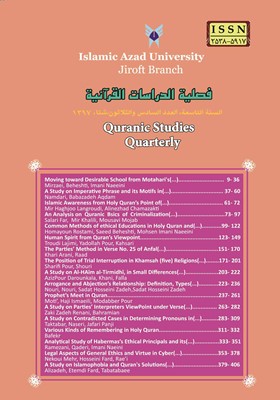Various Kinds of Remembering in Holy Quran
Subject Areas : Quarterly Sabzevaran Fadak
1 - Instructor, Persian Language & Literature, Shahid Madani University, Azerbaijan
Keywords: قرآن کریم, Holy Quran, ذکر, یاد خدا, remembering, Lord’s remembering,
Abstract :
Lord’s cognition and attention by human beings are various and of different levels from Quran’s view point; the lowest level is by verbal remembering, the second level is by heart and the highest and the best one is remembering Him practical. By practical remembering we mean achieving the level of faith and belief in which human knows himself under Lord’s supervision continuously in hidden and reveal, knows Him observer of all his actions, tries to avoid bad deed and accomplish his duties and responsibilities. This research studies and criticizes types of remembering, its advantages and disadvantages. The general outcome of the article is that Lord’s remembering is effective on human’s ethical and spiritual growth and finally makes him transcendental and perfect.
قرآن کریم، ترجمه محمدمهدی فولادوند.
نهج البلاغه، ترجمه علی شیروانی.
آمِدی، ابوالفتح. 1366ش، غرر الحکم ودرر الکلم، قم: دار الکتاب الاسلامی.
جامی، نورالدین عبدالرحمن. 1378ش، مثنوی هفت اورنگ، جلد1، تهران: مرکز مطالعات ایرانی.
حلی، احمد بن فهد. 1368ش، عدة الداعی، قم: دار الکتاب الاسلامی.
خمینی، روح الله. 1361ش، صحیفه نور، جلد 11، تهران: وزارت فرهنگ و ارشاد اسلامی.
خمینی، روح الله. 1394ش، شرح چهل حدیث، تهران: مؤسسه تنظیم و نشر آثار امام خمینی.
خواجوی کرمانی، ابوالعطا کمال الدّین محمود. 1374ش، دیوان، به کوشش سعید قانعی، چاپ اول، تهران: بهزاد.
سعدی، شیخ مصلح الدین. 1379ش، بوستان، تصحیح و توضیح غلامحسین یوسفی، چاپ ششم، تهران: خوارزمی.
سعدی، شیخ مصلح الدین. 1380ش، گلستان، از روی نسخه تصحیحشده محمد علی فروغی، چاپ چهاردهم، تهران: انتشارات ققنوس.
صائب، میرزا محمدعلی. 1375ش، دیوان، 6 جلد، به کوشش محمد قهرمان، چاپ سوم، تهران: علمی و فرهنگی.
عطار، فریدالدین محمد. 1362ش، پندنامه، تصحیح و مقدمه احمد خوشنویس، چاپ اول، تهران: کتابخانه سنایی.
کلابادی، ابوبکر محمّد. 1380ق، التعرّف لمذهب التصوّف، مصر- قاهره: مؤسسۀ النصر.
مجلسی، علامه محمدباقر. 1362ش، بحار الأنوار، چاپ چهارم، تهران: دار الکتب الاسلامیه.
محمد بن منور. 1372ش، آن سوی حرف و صوت: گزیده اسرار التوحید، انتخاب و توضیح از محمدرضا شفیعی کدکنی، تهران: سخن.
مولوی، جلالالدین محمد. 1390ش، مثنوی معنوی، به کوشش دکتر توفیق سبحانی، چاپ پنجم، تهران: سازمان چاپ و انتشارات.
واعظ قزوینی. 1359ش، دیوان، به تصحیح و مقدمه دکتر سیدحسن سادات ناصری، تهران: علمی.
مقالات
خوشحال دستجردی، طاهره و کاظمی، مرضیه. 1390ش، «تأثیر تکاملبخش ذکر در سلوک الی الله»، دوفصلنامه ادبیات عرفانی دانشگاه الزهرا، سال2، شماره 4، بهار و تابستان، صص63-29.
فاضلی دهکردی، مهدی و رضوانخواه، سلمان. 1389ش، «بررسی ذکر و یاد خدا به عنوان یکی از شاخصههای اُنس با قرآن و تأثیر آن در تربیت اخلاقی»، مطالعات قرآن و حدیث دانشگاه امام صادق(ع)، سال4، شماره 1، پیاپی 7، پاییز و زمستان، صص157-129.
محققیان، زهرا. 1378ش، «تأثیر ذکر در آرامش روان»، بینات، سال21، شماره 21، بهار، صص34-21.
محمودی، خیرالله. 1390ش، «ذکر وجودی و شهودی در عرفان اسلامی»، بوستان ادب دانشگاه شیراز، شیراز، سال 3، شماره 1، پیاپی 7، بهار، صص228-207.
_||_
The Holy Qur'an, Translation by Mohammad Mahdi, Falladvand.
Nahj-ol-Balagha, translation of Ali Shirvani.
Amidi, Abu al-Fattah (1366), Rohrallahkam and Derval Kallam, Qom, Darolkabat al-Islami.
Jami, Nouraldin Abdul Rahman (1999), Mathnavi Haft Orang (Vol. 1), Correction and Investigations Jablagh Dawlishah, Asghar Janfda, Zahir Ahrari and Hossein Ahmad Tarbiat, First Edition, Tehran, Center for Iranian Studies.
Helli, Ahmed b. Fahd, (1368),'Adaya al-Dai'ī, Qom, Dar al-Kitab al-Islami.
Khomeini, Ruhollah, (1394), Description of Forty Hadith, Tehran, Institute for the Setting up and Publication of Imam Khomeini Works.
Khomeini, Ruhollah, (1361), Sahifeh Noor (11th), Tehran, Ministry of Culture and Islamic Guidance.
Khajavi Kermani, Abu Alta'a Kamal al-Din Mahmoud (1374), Divan, by the efforts of Saeed Ghanei, First edition, Tehran, Behzad.
Pashluloddestjerdi, Tahereh and Kazemi, Marzieh (2011), "The Impact of the Evolution of Mentioning the Succession of Allah", Two Papers of Mystical Literature at Alzahra University, Tehran, 2nd, 4th, Spring and Summer, pp. 63-29.
Sa'di, Sheikh Mosleh-al-Din, (2000), Bostan, Correction and Explanation of Gholam Hossein Yousefi, Sixth Edition, Tehran, Kharazmi.
Sa'di, Sheikh Mosleh-al-Din, (1380), Golestan, From the Corrected Version of Muhammad Ali Foroughi, Fourteenth Edition, Tehran, Phoenix Publishing.
Saeb, Mirza Mohammad Ali (1375). Divan (6 volumes). By the efforts of Mohammad Ghahreman. Third edition. Tehran: Science and Culture.
Attar, Farid al-Din Mohammad (1362), Pandemic, Correction and Introduction Ahmad Khoshnevash, First Printing, Tehran, Sana'a Library.
Fazeli-e-Kardari, Mehdi and Rezvan-kihah, Salman (2010), "Examining the Remembrance of God as One of the Indicators of Humankind with the Qur'an and its Impact on Ethical Education", Qur'anic and Hadith Studies of Imam Sadiq University AS), Tehran, Year 4, Number 1, Successive 7, Autumn and Winter, pp. 157-129.
Kalabadi, Abu Bakr Muhammad, (1380 AH), Al-Ta'far Lamzdahb al-Tasouf, Egypt, Cairo, Al-Nasr Institute.
Majlesi, Allameh Mohammad Bagher (1362), Baharalanvar, Fourth Edition, Tehran, Publisher Daralkbb al-Islam.
The Magicians, Zahra (1378), "The Effect of Mentioning in Mental Relaxation", Binat, Tehran, Year 21, Number 21, Spring, pp. 34-21.
Muhammad ibn Mounor, (1372), on the other side of the voice and the voice: the choice of the secrecy, the choice and explanation of Mohammad Reza Shafiei-Kadnaki, Tehran, Speech.
Mahmudi, Khairullah (2011), "Existential and intuitive mention in Islamic mysticism", Bostan Adab University of Shiraz, Shiraz, Year 3, Number 1, Year 7, Spring, pp. 228-207.
Molavi, Jalaluddin Muhammad (2011), Masnavi Ma'awi, by Dr. Tofigh Sobhani, Fifth Edition, Tehran, Printing and Publishing Organization.
Vaez Qazvini (1359), Court of Justice, Correction and Introduction Dr. Seyed Hossein Sadat Naseri, First Printing, Tehran, Scientific.

